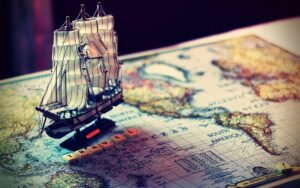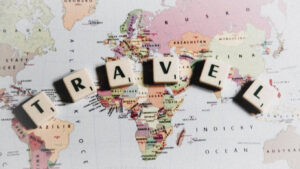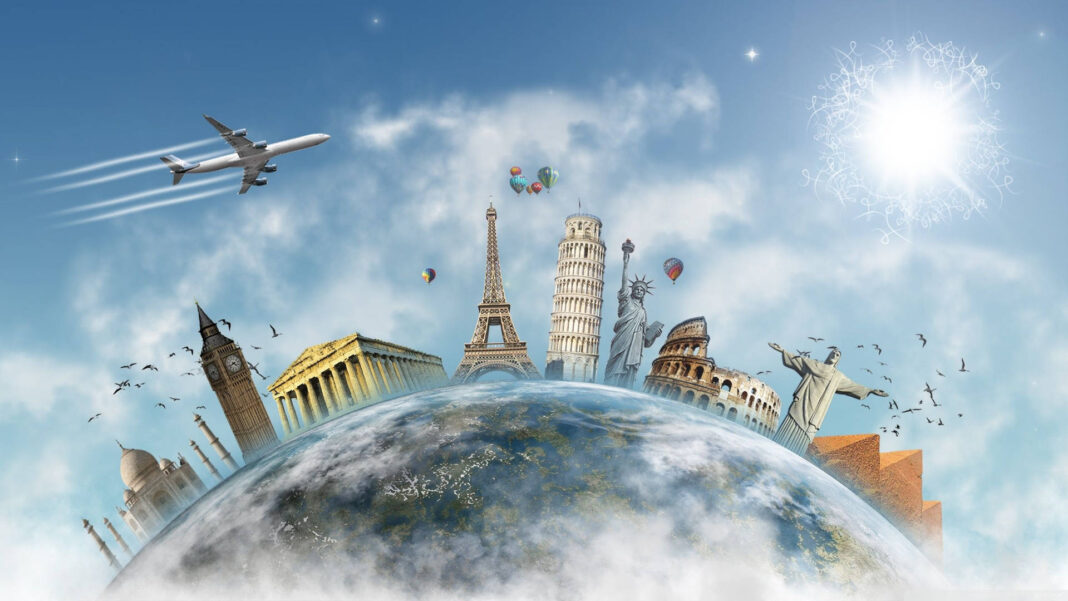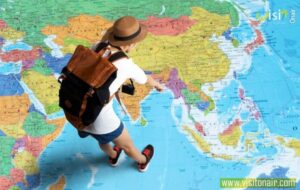Traveling Tips And Guides:

For many, traveling is a must for a happy life.
As surveys show , travel ranks fifth in the ranking of sources of happiness for people. Respondents rate the opportunity to travel higher than, for example, communication with friends, personal safety and even wealth.
Traveling not only makes you feel happy, but also has a beneficial effect on your psyche and health, scientists say.
How to travel on your own – tips and step-by-step tourist guide:
Don’t know what to consider when planning your trip? This guide will save you money, time and stress!
Step 1 – Select your destination:
Where to go?
The first step to planning a trip is to choose a destination that suits your interests and budget.
Are you planning a trip to other countries or a trip around your own country? In any case, the whole idea of a trip is to have an unforgettable time, have fun and relax, and not spend your whole vacation worrying about whether you have enough money and what else you can save on.
What time do you have?
If your vacation is 1-2 weeks a year, you need to consider how long it takes to get to your destination. If the vacation lasts 2-4 weeks, this will not play a special role.
Who are you traveling with?
Do you want to relax alone, as a couple or in a group? Sit down with other potential trip participants and discuss your ideas and interests. Everyone sees this journey differently, based on their personal interests. Don’t let one person make decisions!
What kind of holiday do you like?

Do you like:
- Holidays or adventures
- Beaches and mountains
- Summer or winter
- Cities or countryside
- Resorts or street walks
- Festivals or exhibition culture
- Shopping or food
- Luxury, average or budget holiday
Are you a person who wants to sit by the pool with a book all day? Or does such a vacation seem mortally boring to you?
By answering the questions on the list, you will significantly narrow and refine the list of places that are ideal for travel.
Where to go?
Weather and crowds play an important role when planning your trip. Do you know when high season is in your destination? Avoid the hottest months – both literally and figuratively.
Step 2 – Book your tickets:

Once you have finally decided on your destination, you need to book your tickets. Researching airline deals can help you cut down on your biggest travel expenses. If this is your only vacation of the year, it’s better to pay a little extra and go with a premium airline.
Search flights:
When looking for cheap tickets, it is better to use online services like aviasales.ru, where you can compare different offers by price. Once you’ve found the ticket you’re looking for, go to the airline’s website and see if you can get a discount. Tickets at airport ticket offices and travel agencies are more expensive than online. Therefore, it makes sense to spend time studying the offers of aggregators and directly on airline websites.
By transit – cheaper:
Tickets for flights with transfers are usually cheaper. This point is taken into account by experienced, but not very rich, travelers. Example: a tourist needs to go to Paris. Instead of a direct flight Ekaterinburg – Paris, you can find a flight Ekaterinburg – Paris – London. In the capital of France, a tourist gets off the plane and never returns, saving a couple of tens of dollars. Keep in mind: you only need to take hand luggage with you, because the luggage will fly to the final destination of the flight. Airlines cannot do anything about such “cunning people” and do not try – the tourist does not violate anything. But do not forget that if you immediately bought a return ticket, in this case it may be canceled if you do not fly to your final destination.
Time is money:
When buying a ticket, keep in mind that there are expensive and cheap flight days and times. The most expensive tickets are for Monday morning and Friday evening; at this time people usually fly for work matters, business trips, negotiations, etc. On weekends or midweek, tickets for the same route will be cheaper.
Step 3 – book accommodation for your trip:

Paying for housing is one of the most significant expenses. Choosing the best option will free up more money for additional entertainment.
Traveling is not about finding the cheapest accommodation, but about getting the best service for less money.
Depending on the duration of the trip and the destination, you can choose different accommodation options.
If the trip is planned for longer than a couple of weeks, it is better to stay in a private apartment or house. This will provide several benefits:
- Access to a full kitchen
- Bedrooms separate from the living room
- Own washing machine
- You can book accommodation with 3 or 4 beds and split the cost with friends.
- If the visit to your destination lasts only a week or two, it makes sense to think about a hotel.
Search for accommodation:
There are many services for finding housing. It’s better to look at booking options on several sites at once. Online hotel booking sites, such as booking.com, will provide you with a number of advantages:
- Advance booking
- Free cancellation in most cases
- Consultant support 24/7
- Choosing the best price and accommodation to suit your taste
Step 4 – What to see and do:

Planning your trips is a great idea, especially if you’re going during high season. If the place you want to go to is very popular, it is better to buy your ticket online in advance to avoid standing in hours-long queues. Many countries have “city passes” that can help you get a discount on various attractions.
Plan ahead. Make a list:
- Free classes
- Parks and playgrounds
- Walks
- City tours
- One day trips
Resources:

If you yourself don’t know what you want from the place you plan to visit, use these resources:
- Blogs/Google (enter various search queries)
- Pinterest (create a destination board)
- Websites with tips for tourists
- Ask friends and acquaintances who have already been there
- Ask Facebook for tips
- Twitter (hashtags)
- Guides
- Instagram (hashtags)
- Trip Advisor
- Channel “World of Travel on Yandex Zen”
It is also better to think in advance about how exactly you will move on the spot. Do I need to rent a car or is it better to buy a pass for public transport? Are there trains or buses there? Is there a taxi or uber? Or can most places be reached on foot?
It is better to foresee all these options in advance and correlate them with the places you plan to visit. This will save time and nerves.
You can learn a lot about your destination by exploring the local cuisine. Discover new cafes, restaurants, bars and pubs. Try local delicacies, beer or coffee. You need to plan a visit to such places not only from the point of view of gastronomic pleasure, but also from the point of view of your budget.
Step 5 – Check your documents and visas:

If you don’t have a passport, start solving this problem at least a couple of months before departure. If you have a passport, look at its validity period. Most countries require it to be valid for 6 months after your arrival in your host country and have enough blank pages for stamps/visas.
Each country’s visa requirements vary, so don’t leave this question to the last minute. Usually detailed information is available on embassy websites. You can also use the services of paid intermediaries.
Make copies of documents:
Often important documents are lost during a trip. For your own peace of mind, make copies of important documents and store them separately. Originals can be scanned and stored in cloud storage.
- Passports
- Visas
- Flights
- Routes
- Hotel reservations
- Driver’s licenses
- Other documents
Don’t forget about the children:
Another important point: if you take a child on a trip, customs will require permission to take him abroad. Moreover, the requirements for this item vary in different countries. For example, in France, customs officers require permission from both parents at once, even though the entire family is traveling. Also, permission from both parents will be needed for grandparents who are flying on vacation with their grandchildren.
Step 6 – access to money:

It is best to have several options for storing money while traveling:
- Debit cards
- Credit cards
- Traveler’s checks
- Cash
Check with your bank about the conditions under which you can use their card abroad, if there are any preferential offers or promotions, or whether you need to issue a separate card. The card must be Visa or Master Card.
In some countries, street crime is a common occurrence, and pickpockets do not sleep. Therefore, it is better to store cash in different places. There are several life hacks on where you can hide bills:
– Special ties or socks with secret pockets
– In a medicine box
– In a ballpoint pen
– Underwear with hidden pockets
– Waterproof bags that fit around the neck
And also remember about insurance. Don’t skip this step! If something goes wrong, the lack of an insurance policy will result in inconvenience and significant financial losses. You can insure yourself against the following troubles:
- Natural disasters
- Terrorist act
- Illness or injury while traveling
- Lost or stolen luggage
- Trip cancellation due to force majeure
Step 7 – Smart and Compact Packaging:
Here are 5 basic packing tips:
Check the weather at your destination. In summer you don’t have to carry jackets and coats with you.
When flying, pack clothes in your carry-on luggage in case your main luggage doesn’t arrive on time.
Think about your actions while traveling and take things that you will need when performing these actions.
Consider the type of housing. If this is a hotel, it is not necessary to take bed linen or a hairdryer.
Charge all electronics in advance for photography, gaming, reading and watching.
How Travel Affects the Brain and Personality:
Travel changes our personality:

In 2013, German psychologists suggested that traveling abroad affects a person’s personality no less than serious events such as leaving a parent’s home, getting a first job, or getting into a romantic relationship. Character can change under the influence of the environment – and trips provide an opportunity to communicate with people who are different from their compatriots.
The researchers followed 1,134 students for a year. Almost half went to study in other countries, and the second group spent the entire year in Germany. Before the start of the experiment, all participants filled out a questionnaire in which they answered questions about the extent to which they possessed five qualities: openness to new experiences, conscientiousness, extraversion, agreeableness and neuroticism.
The survey was repeated at the end of the school year and the results were compared. They differed sharply between those who left and those who stayed. The study showed that students who spent the academic year at home became slightly less open, unlike those who went abroad. Agreeableness among those who studied in Germany remained almost unchanged, but among travelers it increased – and by the end of the observations it was almost five times higher than among participants who remained at home. In addition, traveling to other countries made the participants less anxious.
Researchers believe that some personality traits change due to exposure to cultural differences. At first this creates discomfort, but gradually people stop being nervous and begin to perceive the new environment more favorably. To do this, you don’t have to go away to study as an exchange student for a whole year—it’s enough to communicate with foreigners while traveling and immerse yourself in a new culture.
The experience of traveling abroad makes us more friendly not only towards foreigners. American scientists have found that travelers who have visited many countries generally trust people more. Moreover, the duration of the trip turned out to be not as important as the number of trips abroad: the more varied experience a person gets, the easier it is for him to trust others.
Traveling out of town makes people happier:

Interaction with nature helps us show our best qualities. Psychologists from the University of Rochester think so.
They conducted several experiments involving 370 people. They were divided into two groups: some were shown photographs of landscapes, others were shown brutal views of concrete buildings. Everyone had to imagine that he was in the place he saw, and imagine the smells and sounds that might be there.
Participants then completed a questionnaire that assessed how important wealth, fame, a sense of community and close relationships were to them. Those who looked at photographs of the city valued wealth and fame above all else. And those who enjoyed natural scenery valued relationships and a sense of community more highly. The study’s authors believe that landscapes promote self-reflection and reduce the pressure of societal values that alienate people from each other.
It’s no surprise that getting out into nature makes people happier. For example, researchers interviewed tourists who visited Australian national parks. 82% of them said that after these trips they began to feel better. More than half of them noted that visiting parks helped them reduce their stress levels.
The tourism industry takes advantage of the great outdoors by offering “adventure tours,” which typically include activities such as mountain climbing, white water rafting or snowmobiling. But researchers believe that quiet types of recreation, without such vivid impressions, can be no less beneficial for the psyche. A long stay in nature and a break from the urban pace of life will already ensure good mental well-being. You’ll feel better if you go on a multi-day camping trip where you cook, set up tents, and tell stories around the campfire.
If it is not possible to go out of town for a few days, you can also get benefits from regular walks in the forest. This was discovered by scientists who studied the practice of shinrin-yoku – relaxing walks in the forest, which are popular in Japan. During them, it is recommended to turn off mobile phones, walk in silence, completely dissolving in the forest landscapes.
According to the Japanese, such walks help relieve oneself of the stress caused by life in a frantic city rhythm, recover and reboot. Scientists agree: a review of 64 studies found that shinrin-yoku actually relieves stress and anxiety, and people who walk in forests and parks begin to feel happier.
Travel makes people healthier:

Traveling is a pretty serious test for the brain. You find yourself in an unfamiliar environment, especially if you come to a country where the culture is very different from yours. The brain receives a lot of new information that needs to be processed, and as a result, new dendrites appear – the processes of neurons, thanks to which the brain can process more data.
The same mechanism is triggered when a person is faced with any difficult task or unusual activity: learning a foreign language, mastering a new hobby, or looking for a way in an unknown place. If you constantly arrange similar tests for yourself throughout your life, you can maintain brain health longer – such an experience is considered a good prevention of dementia.
Brain health isn’t the only thing that benefits from travel. For example, Chinese scientists have found that travelers are less susceptible to fatal diseases than couch potatoes. Moreover, we are not necessarily talking about holidays at expensive resorts – short trips to relatives also count.
The researchers analyzed data from the National Health Survey of Older Adults—age 65 and older—who were asked how often they traveled outside their hometown or abroad.
There were few elderly travelers in China: only 7.85% of more than nine thousand respondents had traveled somewhere at least once in the past two years. However, their risk of mortality was 27% lower than that of those who had not left their city for a long time. The authors of the work believe that travel can influence life expectancy because it provides physical exercise and improves the psychological state of older people. Another group of Chinese researchers came to similar conclusions. In their study, they note that tourism can be one of the components of the concept of “healthy aging” – in which older people, while maintaining good health, remain active members of society.
Of course, traveling is useful not only for retirees. A review of 29 studies found that a change of scenery also affected the well-being of students and working people: for example, respondents reported feeling healthier and more energetic, sleeping better, and their stress levels after going on vacation.
Moreover, even virtual excursions turned out to be useful. Canadian scientists observed 18 residents of nursing homes for a month and a half – they were from 71 to 96 years old. Three times a week, participants in the experiment went on a trip using headphones and virtual reality glasses. After completing the study, they reported that their quality of life had significantly improved, with less fatigue and anxiety. In addition, social activity increased: according to participants, virtual tourism provided them with a reason to socialize with friends and family.
Travel develops creativity:

Traveling to other countries has a positive effect on creativity. For 11 years, scientists collected data on the creative heads of the largest fashion houses: their biographies, level of education, age, and also calculated how much time they spent traveling abroad. In addition, the researchers asked industry experts to rate each collection’s creativity on a 20-point scale.
It turned out that people consider managers with foreign professional experience to be more creative. This partly explains the success of Karl Lagerfeld, the authors of the work believe. The fashion designer was born in Germany and worked in France and Italy, often traveling between these two countries. In his collections, Lagerfeld used the cultural characteristics of these countries, thanks to which he left his mark on the entire global fashion industry.
Multicultural experience in general perfectly stimulates cognitive abilities, including creative ones, scientists say. To test their hypothesis, they conducted a small experiment involving 102 international students attending a university in Malaysia. First, the scientists found out how open the students were to new experiences, and then asked the participants about their experiences communicating with representatives of different cultures: Malaysians, immigrants, and other foreign students. Then the participants were given a task: to attach a wax candle to the wall so that when it burns, the wax does not drip onto the floor. The only equipment the students were given was the candle itself, matches and a box of push pins.
Only 31% of the experiment participants guessed that they needed to pour the buttons out of the box, put a candle in it, pin the box with the buttons to the wall and light a fire. Moreover, it turned out that those students who were most open to new experiences and traveled more than others used the box as a candlestick.
Researchers believe that experience of living in other countries, combined with openness, helps to look at the problem from a different angle. And as a result, find a solution that will not occur to others.


